Pre-employment screening helps recruiters find the best candidates based on skills and qualities rather than just resumes. It's a way to ensure you hire the right people for your business.
This blog post exists to help you compare Adaface and Criteria, two leading assessment providers. By the end, you'll know which platform suits your hiring needs best.
Explore this post with:
Table of contents
How does Adaface work?
Adaface is a leading online assessment platform designed to help companies find the best talent through customized, skills-based evaluations. Its tests are crafted to gauge a candidate's proficiency in various job-specific and technical skills.
Recruiters use Adaface to create personalized assessments that align with specific job descriptions. This ensures that the candidate's skills are accurately measured, reflecting real-world scenarios and minimizing the risk of hiring mistakes.
Additionally, Adaface offers a conversational interface that makes the candidate experience feel more engaging and less like a traditional test. This feature has proven to reduce candidate drop-off rates and improve overall satisfaction.
Among its standout features, Adaface provides robust proctoring capabilities, including webcam monitoring and location tracking, to maintain test integrity. This ensures that assessment results are reliable and trustworthy. For more details, explore the Adaface Online Assessment Platform and its proctoring features.
How does Criteria work?
Criteria is a pre-employment assessment platform that helps companies evaluate candidates through standardized tests. Their goal is to measure skills and compatibility for specific roles in a streamlined manner.
The platform offers various tests, including aptitude, personality, and situational judgment assessments. For instance, if a company is hiring a customer service representative, they can use Criteria to filter candidates based on how they handle hypothetical scenarios.
Some of the best features of Criteria include a library of ready-to-use tests that allow recruiters to get started quickly. They also provide insights into a candidate’s skills, making it easier to assess if someone fits within their desired job criteria.
However, Criteria lacks customizable assessments tailored specifically to job descriptions, which can limit a recruiter’s ability to accurately gauge candidate skills based on the unique needs of each position.
Adaface vs Criteria: Test libraries
Adaface's test library is a powerhouse, featuring over 500+ pre-employment assessment tests across various domains. From programming and AI to business skills and languages, Adaface covers it all.
Criteria's test library, while comprehensive in aptitude and personality assessments, lacks in technical areas. They don't offer programming tests or AI-related assessments, which limits their appeal for tech recruiters.
Adaface's test library
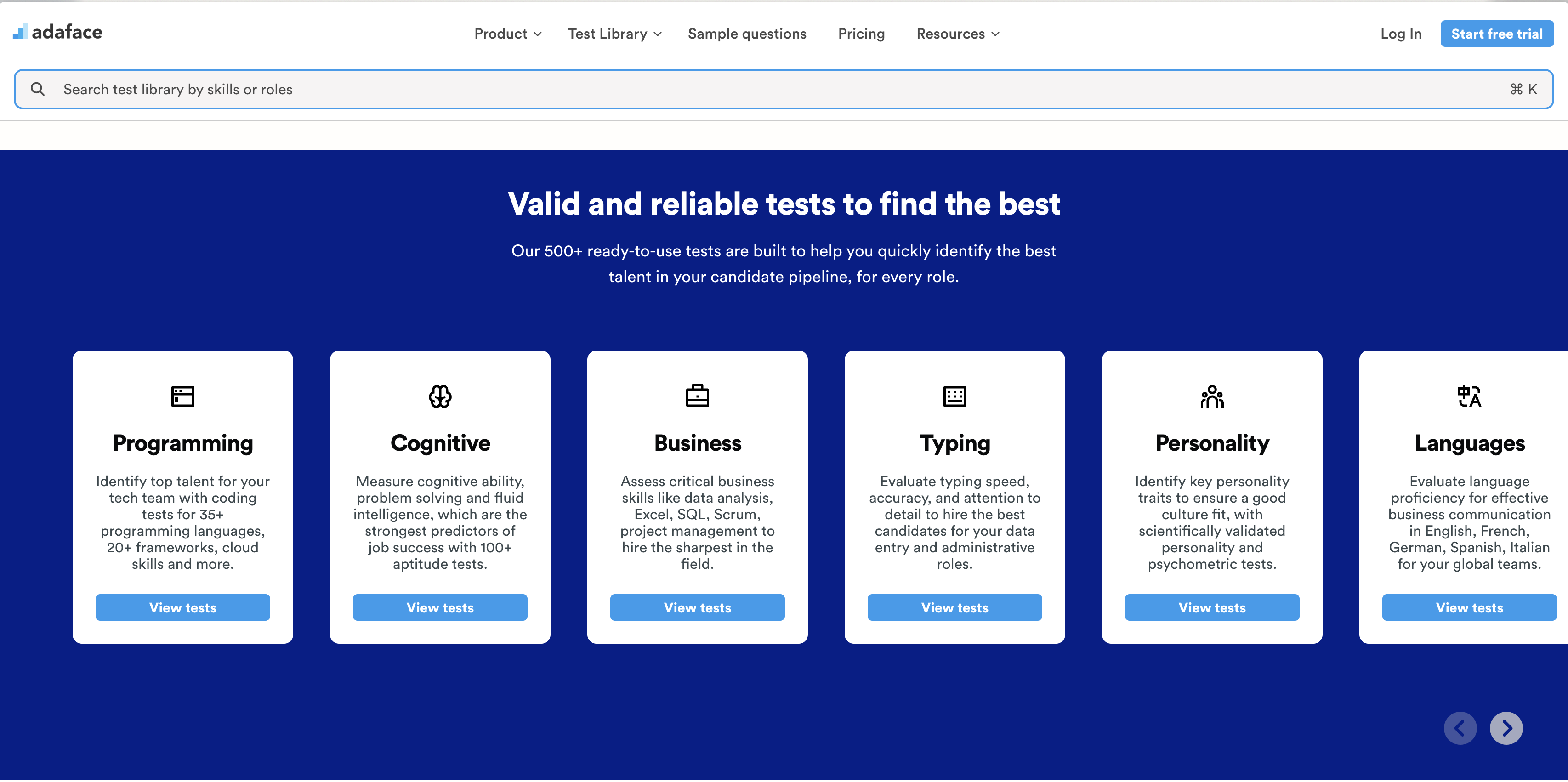
Adaface's library shines with its diversity:
- Programming tests with both MCQs and coding questions
- AI and cloud computing assessments
- Business and finance tests
- Multiple language proficiency tests
- Job-specific role tests
Recruiters love Adaface for its flexibility. You can create custom questions, add your own, or get a test tailored to your job description. It's like having a personal test designer at your fingertips.
Using Adaface is a breeze. Pick a ready-to-use test for instant screening, or craft a custom one for that perfect fit. Either way, you're set to find your ideal candidate in no time.
Criteria's test library
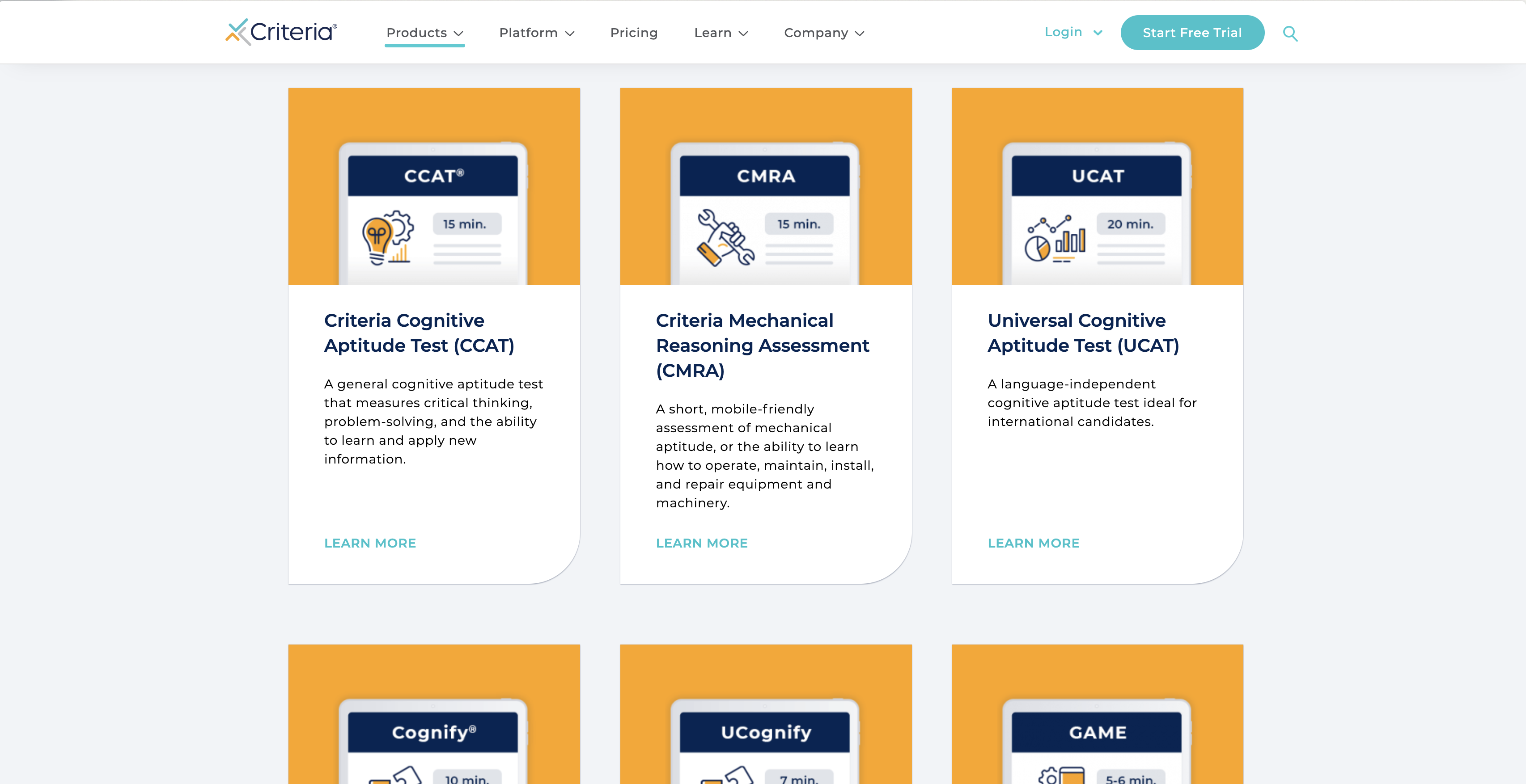
Criteria offers a test library that includes situational judgment tests, aptitude assessments, and personality evaluations. However, it notably lacks programming, business, and language tests, which are critical for a well-rounded hiring process.
One of the standout features of Criteria's library is its situational judgment tests. These are useful for assessing how candidates might handle real-world scenarios, giving employers insights into their decision-making abilities.
While Criteria provides some valuable tests, the absence of job-specific assessments and customizable questions means companies may miss out on more tailored evaluations that match their unique hiring needs.
Comparison of test libraries
Adaface vs Criteria: Business, Marketing and Ops Roles
Recruiters often rely on tests to screen candidates because they provide insights into whether applicants can perform the specific tasks required by the job role. Both Adaface and Criteria offer platforms to evaluate on-the-job role-specific skills, ensuring candidates are fit for the position at hand.
Adaface's functionalities for testing on-the-job skills are designed to give recruiters a real sense of a candidate's capabilities. Meanwhile, Criteria provides a range of tests that assess candidates' skills, helping recruiters make informed decisions during the hiring process.
Business, Marketing and Ops Roles with Adaface
Adaface offers a wide variety of test functionalities tailored for role-based skill screening. These include:
- Programming tests with scenario-based MCQs and coding challenges
- Aptitude tests covering logical, numerical, and verbal skills
- Business and role-specific tests like sales, marketing, and finance
- Customizable tests to match specific job descriptions
Recruiters choose Adaface to test skills because it provides tailored assessments that align with the job description, improving the accuracy of hiring decisions. Custom questions and scenario-based challenges ensure that candidates can handle the tasks they will encounter in the role.
Additionally, Adaface allows recruiters to add their own questions and easily customize tests to reflect the specific needs of their organization. This flexibility ensures that businesses can effectively identify candidates who will thrive in their unique environment.
Hiring Business, Marketing and Ops Roles with Criteria
Criteria offers a well-rounded approach to non-developer roles, with tests that range from situational judgment to personality assessments. These tools are designed to evaluate qualities that are critical for various business positions, ensuring candidates are not just theoretically proficient but also practically adept.
The test library at Criteria includes a substantial collection of ready-to-use assessments, making it convenient for hiring managers to select tests that align with their needs. This is particularly useful for roles that require precise aptitude and typing skills, allowing companies to gauge these abilities effectively.
However, Criteria's offerings have a few gaps when it comes to specific skill-based assessments. The absence of business and finance tests might pose a challenge for roles that demand specialized knowledge in these areas. Additionally, the lack of customization options for tests per job description may limit tailoring assessments to specific job requirements.
Adaface vs Criteria: Developer hiring
When hiring developers, it's important to assess a candidate's full range of technical skills to ensure they align with your team and workload. Both Adaface and Criteria provide tools to help you screen developers effectively.
Adaface offers a range of functionalities such as programming language coding questions, web and mobile framework questions, and SQL coding tasks. Criteria, on the other hand, primarily focuses on MCQ-based assessments without in-depth coding evaluations.
Hiring developers with Adaface
Adaface provides a variety of functionalities for hiring developers, including:
- Coding questions in multiple programming languages
- Web and mobile framework questions
- Data structures and algorithms questions
- SQL coding and Excel simulation tasks
- Code playback and automated scoring
- Custom coding questions
Recruiters prefer Adaface for hiring developers because it covers both theoretical and practical aspects of coding. This helps in evaluating not just the knowledge but also hands-on skills of candidates, making the screening process more reliable.
Additionally, Adaface's platform includes features like code playback, which allows recruiters to review the coding process, and automated scoring to save time. You can even create custom coding questions to tailor assessments to your specific needs.
Hiring developers with Criteria
Criteria's programming assessment capabilities are limited. They don't offer coding questions for various programming languages or web frameworks. Their focus seems to be on other areas of pre-employment testing.
While Criteria lacks specific developer hiring tools, they do provide some general cognitive ability tests. These might be used as a basic screening for problem-solving skills, but they're not tailored for technical roles.
For companies looking to hire developers, Criteria's offerings fall short in key areas. There's no support for hands-on coding tasks, SQL queries, or data structure assessments. The absence of these features makes it challenging to evaluate a candidate's practical programming skills.
Comparison of developer hiring features
Adaface vs Criteria: Candidate experience and company branding
Candidate experience plays a significant role in determining whether applicants complete their assessments. A seamless and engaging experience ensures candidates don't abandon the test midway, safeguarding both their time and the company's resources.
When evaluating pre-employment assessment tools, factors such as ease of use, mobile compatibility, and support options are paramount. These features not only enhance the user experience but also reflect the company’s commitment to a professional and user-friendly hiring process.
Candidate experience and company branding with Adaface
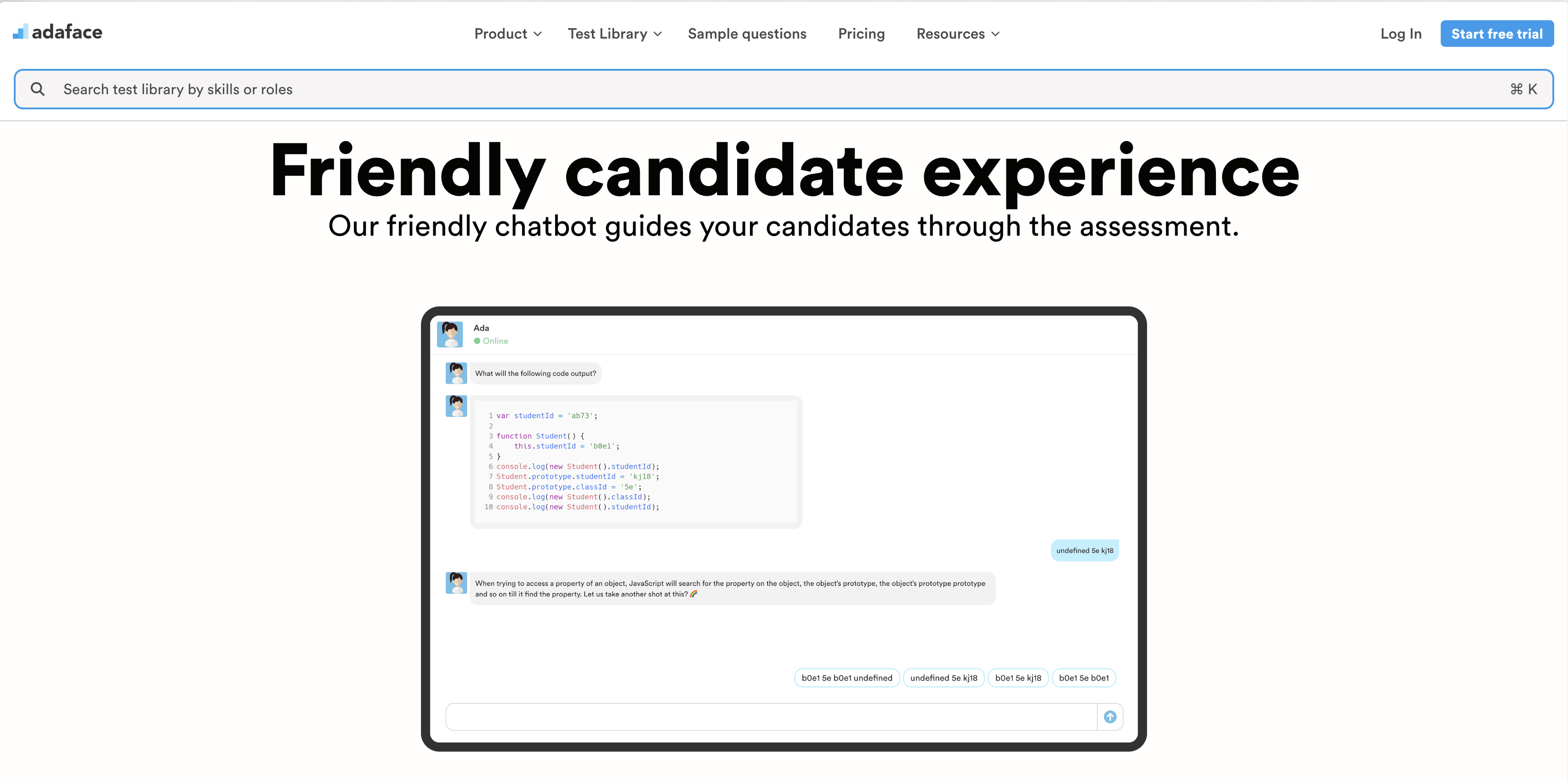
Adaface's tests stand out with a conversational interface that transforms assessments from tedious to engaging. This interactive approach makes candidates feel like they're in a dialogue rather than taking a test, which can drastically improve their overall experience.
Moreover, Adaface assessments are mobile-friendly, allowing candidates to complete tests on the go. This flexibility is especially beneficial for those juggling multiple responsibilities, ensuring that the assessment process fits into their lives seamlessly.
Additionally, Adaface provides comprehensive support through email and help documentation, ensuring candidates have all the resources they need for a smooth assessment journey. This is particularly useful for clarifying any questions or issues that arise during the test process.
Candidate experience and company branding with Criteria
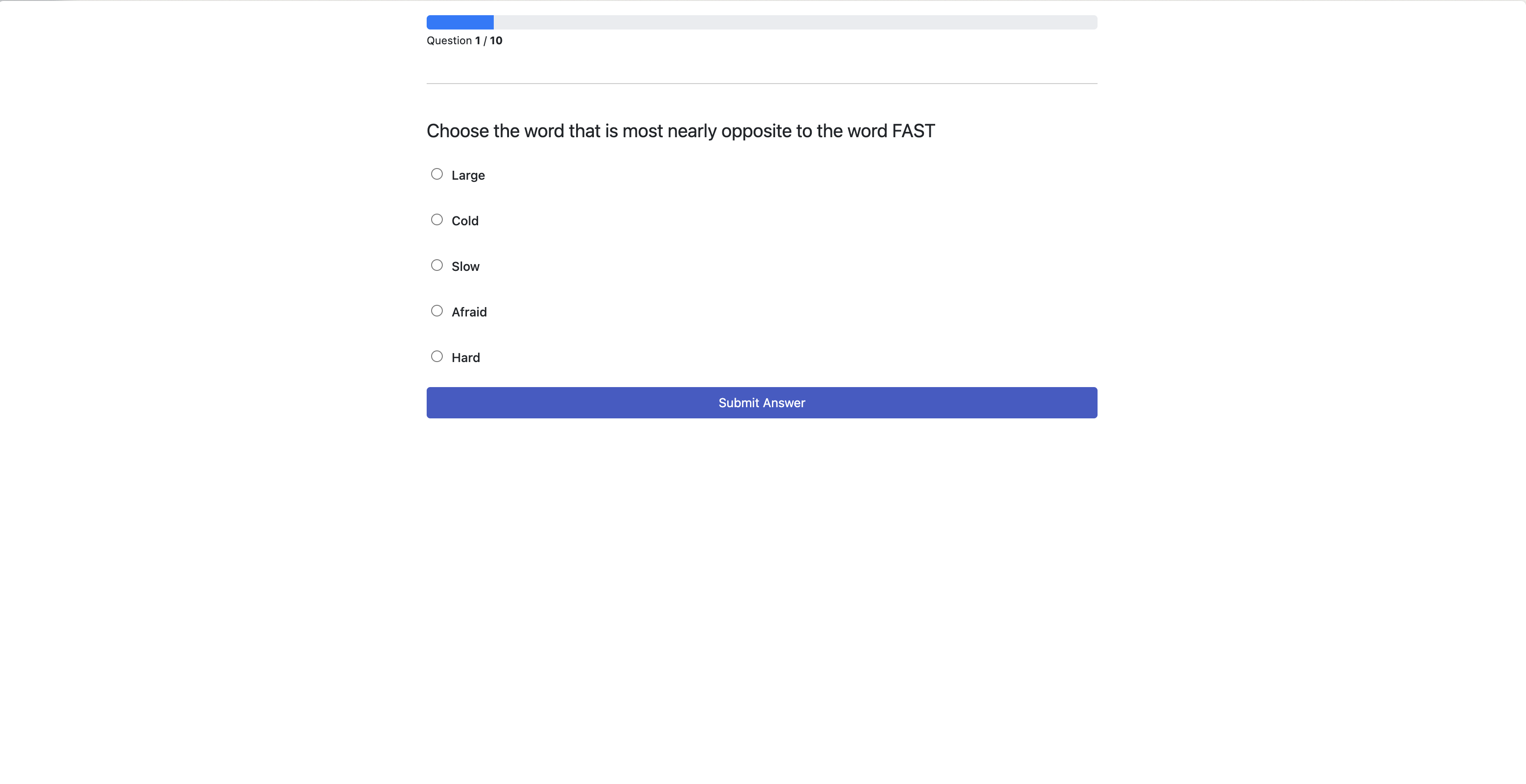
Criteria provides a fairly standard candidate experience. The platform is mobile-friendly, and candidates can easily access assessments on their phones. Email support and help documentation are available to assist candidates during the process.
For employers, Criteria offers a straightforward approach to candidate assessments. Candidates can take tests on their mobile devices, making it convenient for those on the go. The help documentation ensures that candidates have the resources they need at their fingertips.
However, Criteria lacks some features that could enhance the candidate experience. There are no qualifying questions to filter out unsuitable candidates early on, and the platform does not offer a conversational interface, which can make the tests feel more like traditional exams.
Adaface vs Criteria: Anti-cheating features
Recruiters need reliable proctoring features to maintain the integrity of online assessments. Ideal platforms should provide a range of anti-cheating measures to ensure fair and accurate results.
Anti-cheating features of Adaface
Adaface offers an impressive suite of anti-cheating features. These include:
- Non-googleable and non-GPTable questions
- Email authentication and IP proctoring
- Browser tab tracking and full-screen proctoring
- Location logging and device fingerprinting
- Webcam proctoring and copy-paste protection
- Chat GPT protection and plagiarism detection
- Social listening for task leaks
Adaface's webcam proctoring and full-screen monitoring ensure candidates are present and focused on the test. Web proctoring tracks if candidates leave the test window, instantly flagging suspicious activity.
Additionally, Adaface employs Chat GPT protection and plagiarism detection, which help identify any AI-assisted cheating or duplicate responses. These features give recruiters confidence in the authenticity of assessment results, leading to better hiring decisions.
Anti-cheating features of Criteria
Criteria offers some basic anti-cheating features. They use time limits on tests and track user location during assessments. They also require user authentication before starting a test.
These features can help prevent simple forms of cheating, like having someone else take the test or spending too long researching answers. They're useful for companies wanting a basic level of test security.
However, Criteria lacks several advanced proctoring features. They don't offer webcam monitoring, full-screen enforcement, or protection against AI tools like ChatGPT. They also don't use device fingerprinting or IP tracking, which could allow some sneaky test-takers to slip through the cracks.
Comparison of anti-cheating features
Adaface vs Criteria: Pricing and free trial
When it comes to pricing for assessment products, recruiters can expect a range of options depending on their specific needs. Many providers have different tiers, which can make it a bit of a treasure hunt to find the best fit for your hiring strategy. Spoiler alert: we have a few tricks up our sleeves!
Adaface pricing
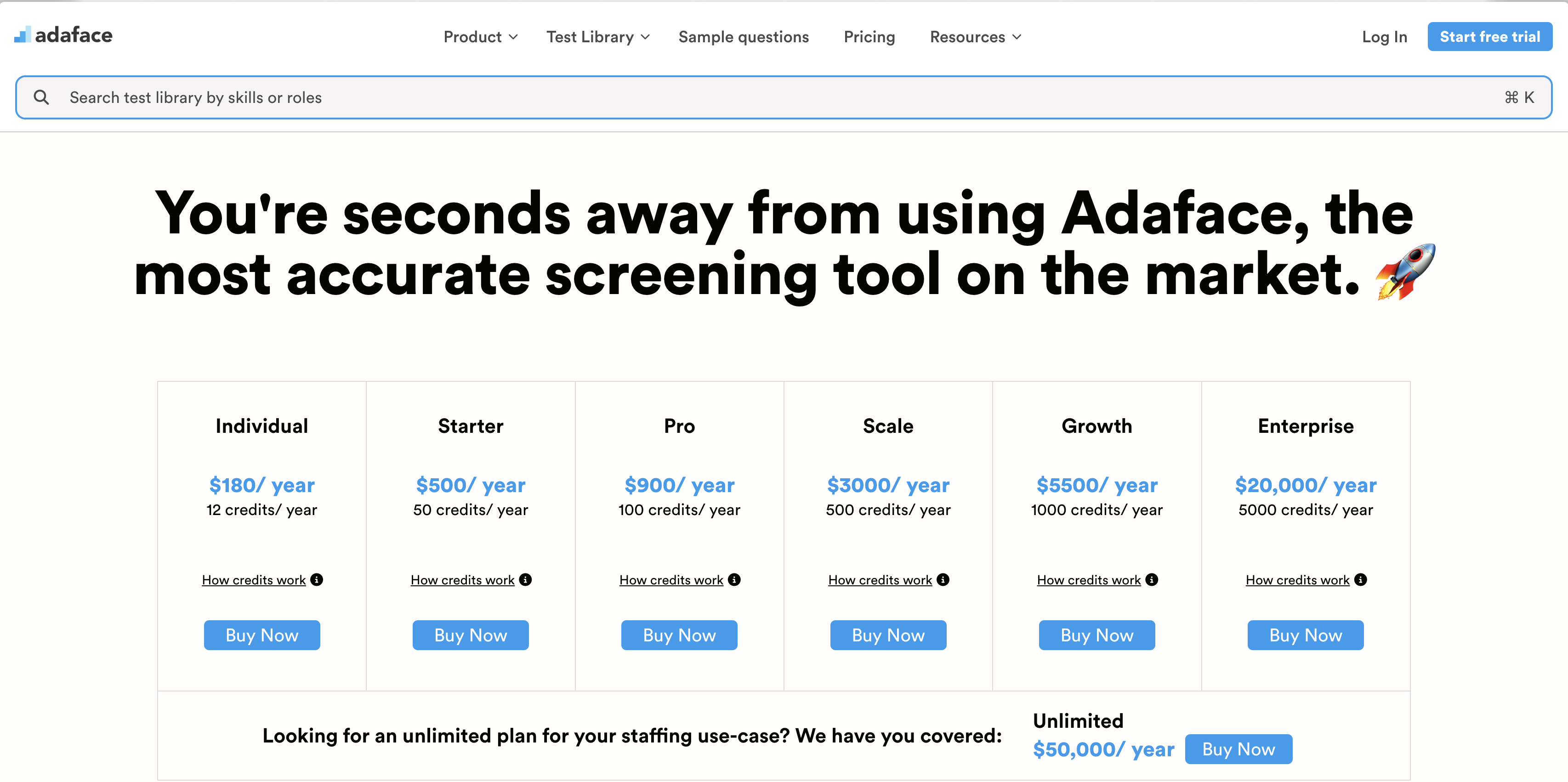
At Adaface, our pricing is designed to be transparent and accessible. We offer several plans to suit various hiring needs, starting with our Starter Plan at $500 for 50 credits. For those looking to scale, our Scale Plan is available for $3,000, giving you 500 credits to work with.
Our Growth Plan is perfect for companies on the rise, priced at $5,500 for 1,000 credits. And for those with large-scale hiring needs, our Enterprise Plan offers 400 credits for $20,000. Want the freedom to assess candidates without limits? Check out our Unlimited Plan for $50,000 a year.
In real-world terms, this means you can choose a plan that fits your team size and hiring pace. If you're unsure where to start, you can explore all our features with a free trial, so you can see what works best before committing. For more details, don’t forget to visit our Adaface Pricing page!
Criteria pricing
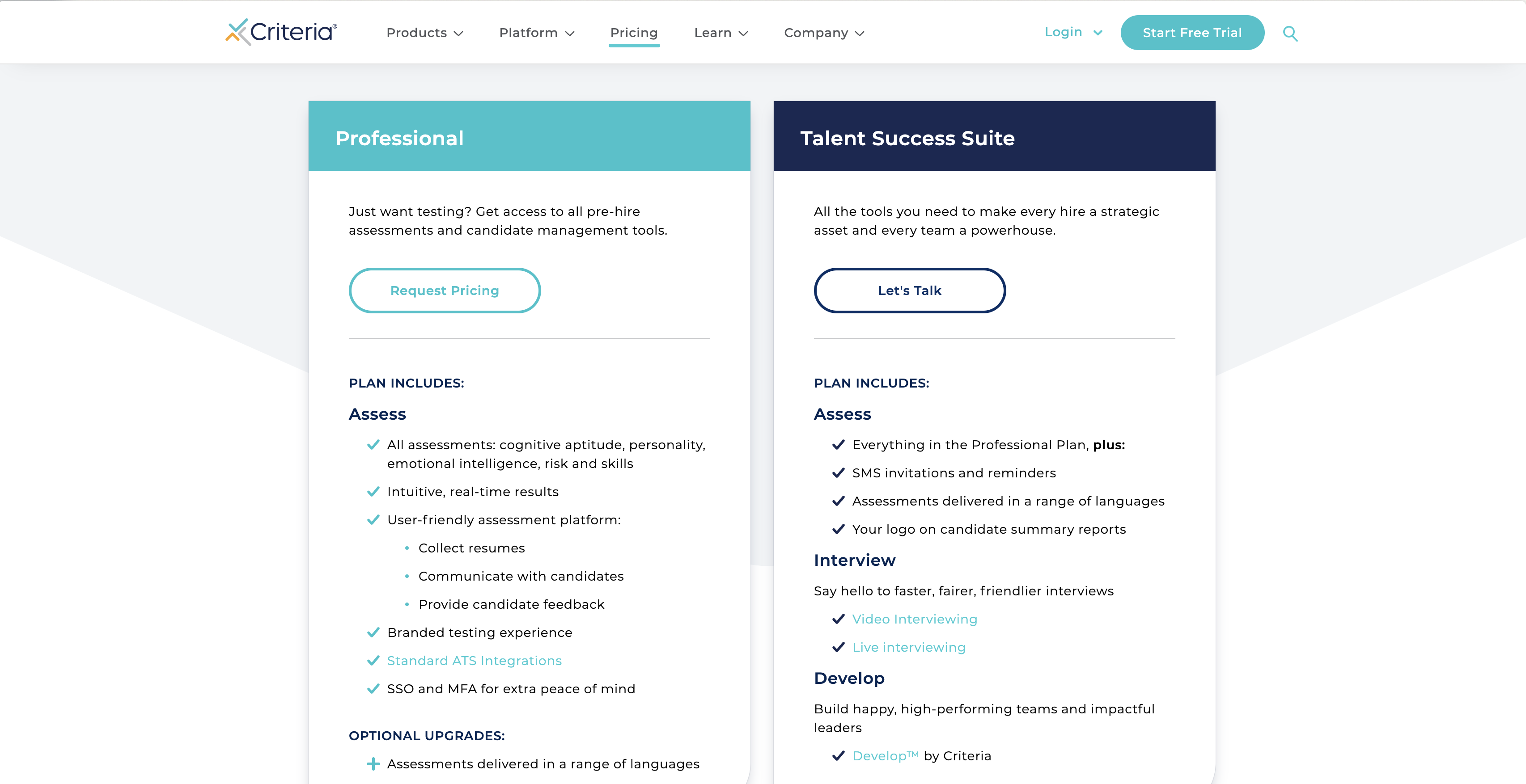
Criteria offers a variety of pricing plans tailored to different needs, but they don’t share them openly on their website. This can make it feel like a treasure hunt for potential customers. Here’s a snapshot of their offerings:
- Individual Plan: Pricing is not disclosed.
- Starter Plan: Pricing starts at $500 for 50 credits.
- Scale Plan: Pricing starts at $3,000 for 500 credits.
- Growth Plan: Pricing starts at $5,500 for 1,000 credits.
- Enterprise Plan: Contact Criteria for a pricing quote.
- Unlimited Plans: Not available.
While they do allow for various credits, the lack of clear pricing can leave potential customers feeling a bit lost.
Navigating Criteria's pricing model can be a bit like trying to decipher a secret code. Without a free trial or clear sign-up options, recruiters may find themselves longing for a chance to test the waters before diving in. The absence of features like easy exploration and transparent pricing can create hurdles, making it harder to evaluate what fits best for their hiring needs.
Comparison of pricing
Adaface vs Criteria: Scorecards, reporting and analytics
An ideal assessment platform must offer robust scorecards, insightful reporting, and actionable analytics features to help recruiters make informed hiring decisions. These tools provide a clear view of candidate performance and enable quick, data-driven comparisons.
Adaface scorecards, reporting and analytics
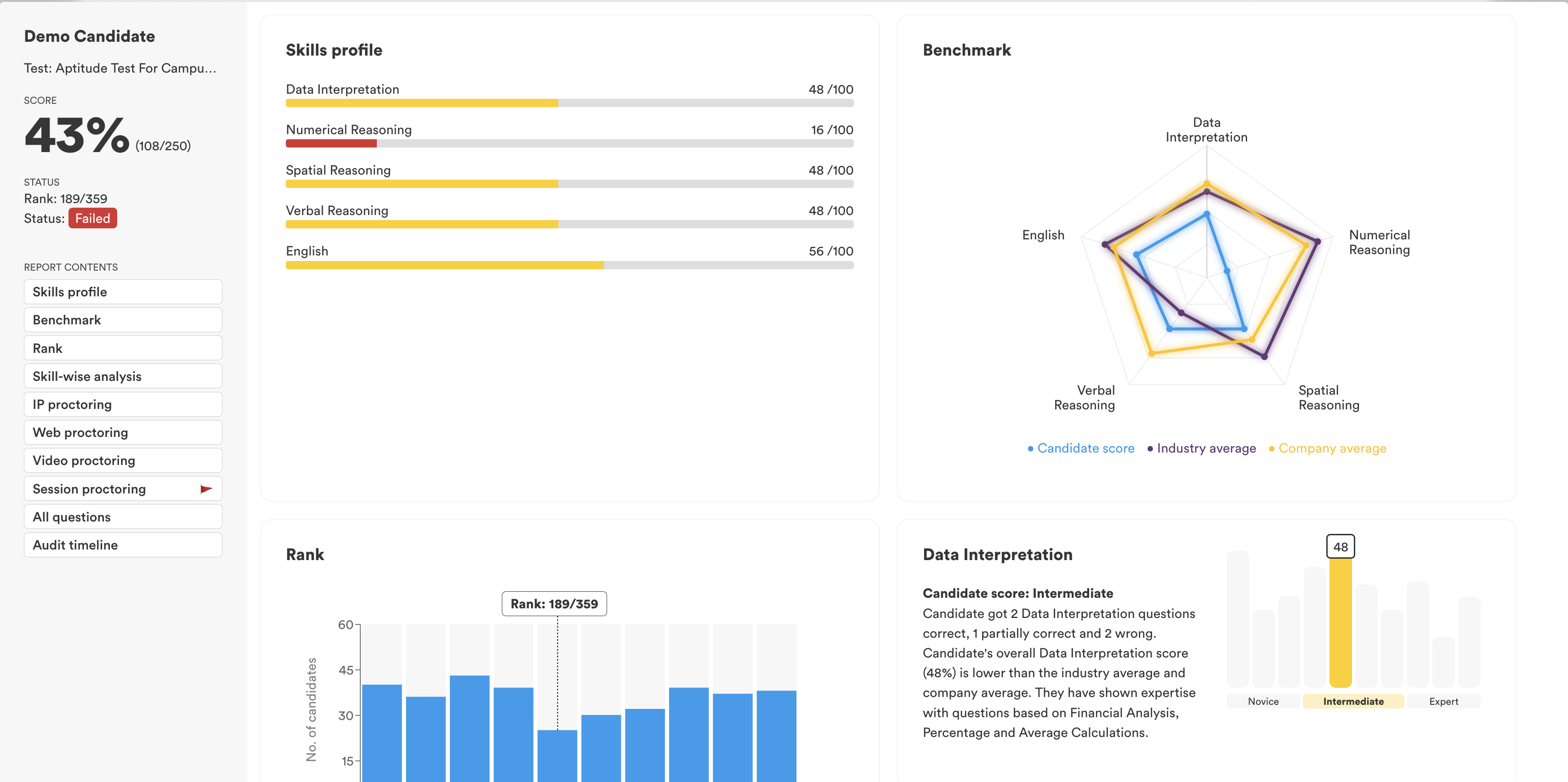
Adaface offers a suite of advanced scorecards, reporting, and analytics features tailored to meet the needs of modern recruiters. PDF reports, public links for easy sharing, and export options in Excel and CSV are available, making it effortless to share and evaluate candidate data.
Adaface’s scorecards are designed to provide a comprehensive view of candidate skills and performance. Recruiters can leverage skills profile and benchmarking features to compare candidates against industry standards and company averages.
For an in-depth look at how candidates perform in specific skill areas, Adaface provides detailed audit timelines and an automated scorecard generation system. This ensures recruiters have immediate access to real-time data, allowing them to act fast on the best candidates.
Criteria scorecards, reporting and analytics
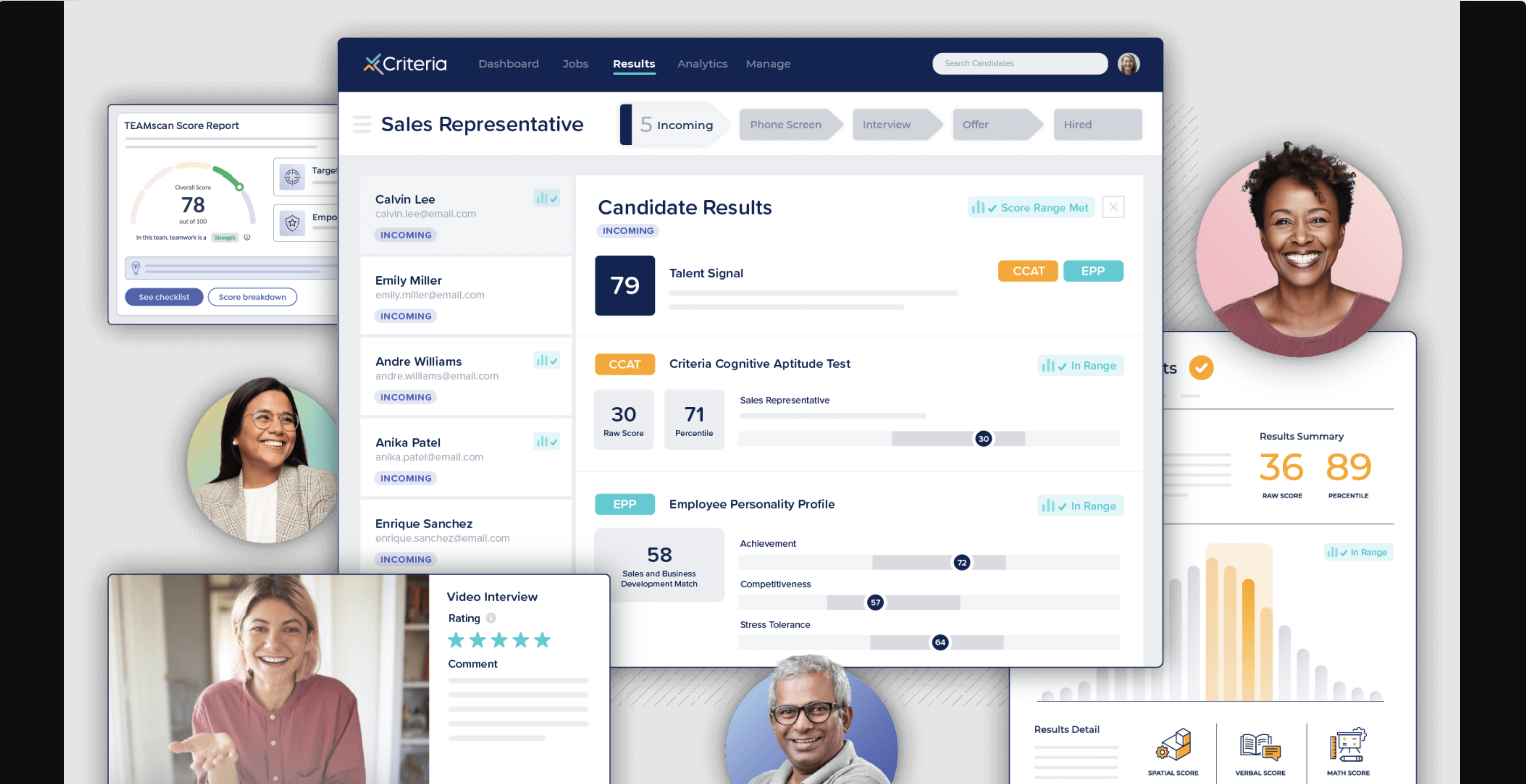
Criteria offers a range of reporting features for its assessments. They provide CSV reports for easy data analysis and a skills profile to quickly understand a candidate's performance across different areas. The platform also generates automated scorecards and alerts to speed up the hiring process.
The platform includes a comprehensive overview that allows recruiters to compare multiple candidates at once. This feature helps in making quicker decisions by presenting skill scores side-by-side, giving a clear picture of how candidates stack up against each other.
While Criteria covers many bases, it's worth noting that some features are missing. For instance, there's no option for PDF reports or public sharing of scorecards. The platform also doesn't offer benchmarking or a detailed audit timeline, which could be useful for more in-depth analysis.
Comparison of scorecards, reporting and analytics
Adaface vs Criteria: Enterprise and startup friendliness
A good pre-employment testing platform should work well for companies of all sizes. It needs features like ATS integration, GDPR compliance, and API access to support different hiring needs.
Adaface's enterprise and startup friendliness
Adaface offers a range of features that make it suitable for both startups and large enterprises. Its ATS integrations allow for seamless use within existing HR systems, while GDPR compliance ensures data protection standards are met.
For companies hiring at scale, Adaface provides multiple invite options and bulk actions. These features streamline the process of managing large numbers of candidates, especially useful for events like campus recruiting.
Adaface also caters to specific enterprise needs with custom API access, role-based permissions, and the option for custom data location. These features provide the flexibility and security that larger organizations often require in their hiring process.
Criteria's enterprise and startup friendliness
Criteria offers ATS integrations and GDPR compliance for enterprise users. They provide multiple invite options for candidates and support large-scale hiring processes.
Companies can use Criteria's features to streamline their recruitment workflow. For example, they can easily invite thousands of candidates for campus hiring events or bulk assessments.
However, Criteria lacks custom API support and role-based access control. It also doesn't offer unlimited team seats or multiple question sets, which can be limiting for some organizations.
Comparison of enterprise and startup friendliness
Adaface vs Criteria: Assessment quality control
Quality control in assessments ensures that tests measure what they are supposed to measure, providing reliable results for recruiters. It influences candidate selection, making it a critical aspect of any recruitment strategy.
Adaface's quality control features
Adaface implements a comprehensive quality control process that includes rigorous checks before any question goes live. This ensures that each question is relevant and effectively assesses a candidate's skills.
The platform also actively gathers and incorporates feedback from both candidates and customers, allowing for continuous improvement of the test library. By listening to social channels, Adaface prevents question leaks and keeps tests fresh and challenging.
With proprietary algorithms in place, Adaface evaluates the quality of questions and replaces those that have been overused. Recruiters can trust that the assessments they administer are both current and valid, making their hiring decisions more informed.
Criteria's quality control features
Criteria does not openly detail its quality control processes. There is limited information available on their public channels about how they ensure the quality and accuracy of their assessments.
It is unclear whether Criteria incorporates candidate or customer feedback to improve their tests. The absence of proprietary algorithms for question quality analysis also raises questions about their approach to maintaining high standards.
Without evidence of quality checks before questions go live or mechanisms to replace overexposed questions, Criteria's process might lack some key elements that ensure ongoing reliability and validity of their assessments.
Comparison of quality control
Adaface vs Criteria: Customer support
Knowing your pre-employment screening platform is backed by strong customer support provides peace of mind during the hiring process. Top providers offer both on-demand support and a wealth of online resources for users.
Adaface's customer support features
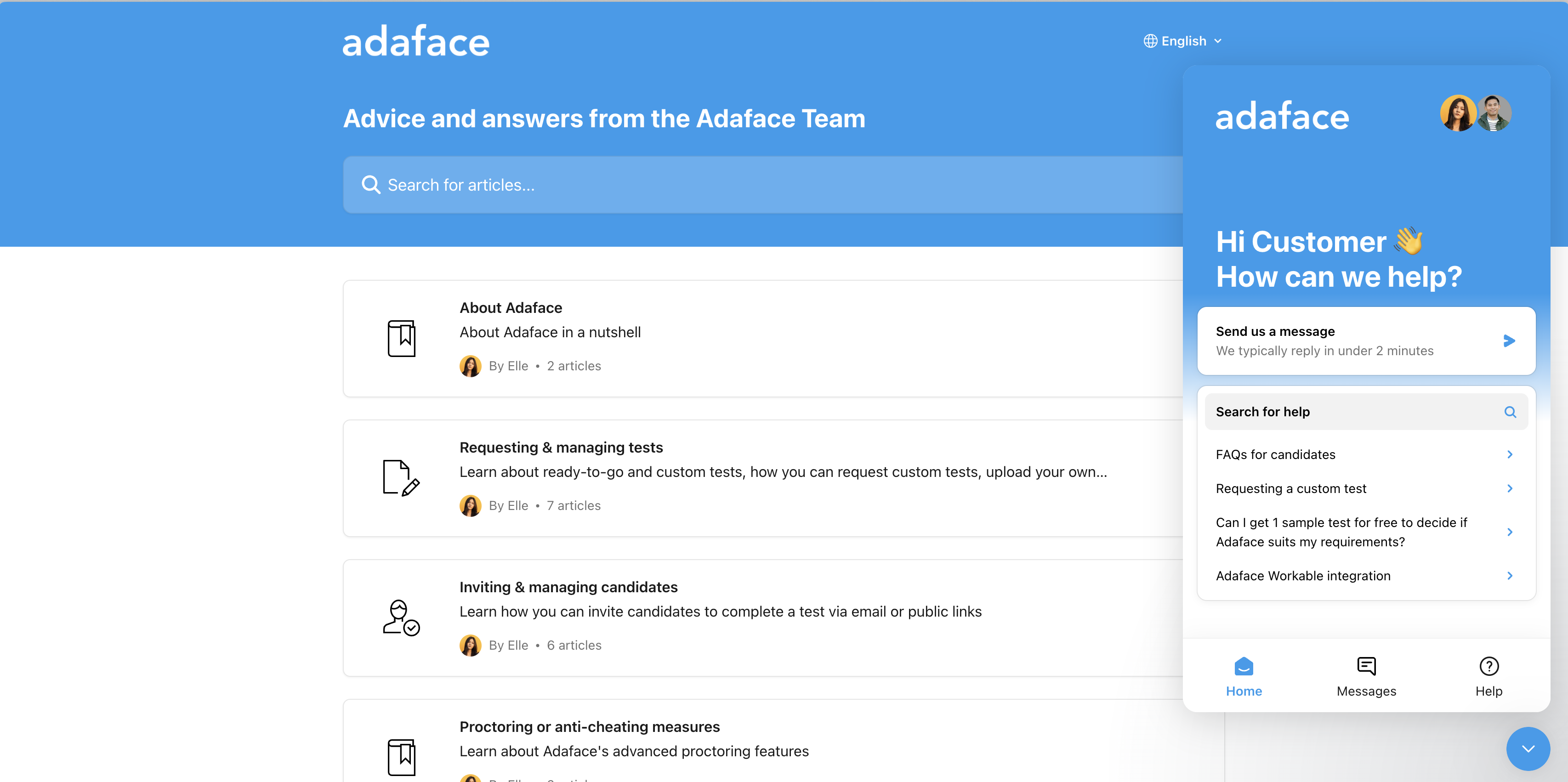
Adaface offers multiple customer support channels including email, live chat, and phone assistance. This ensures that recruiters can always find the help they need, whether it's a quick question or a more complex issue.
For those who like to find answers themselves, our help center is a treasure trove of useful articles and guides. It’s perfect for getting the most out of our platform.
Recruiters subscribing to our enterprise plans get dedicated priority support. This means you have a go-to person for any issues, making your experience smoother and more personalized. For a deeper dive into our features, visit our product tour.
Criteria's customer support features
Criteria offers email support and maintains a help center on their website for customer assistance. These resources aim to address common questions and provide guidance to users.
While basic support options are available, the platform lacks live chat functionality for instant communication. Additionally, there's no mention of phone support or dedicated priority assistance for enterprise clients.
Comparison of customer support
Adaface vs Criteria: Final verdict
Both Adaface and Criteria offer features like aptitude tests and personality assessments. They aim to give recruiters a clear idea of a candidate's abilities.
Even with these similarities, Adaface stands out due to its scenario-based MCQs and coding questions, providing a more accurate assessment of technical skills.
Criteria lacks several important features like programming tests and AI test options. These can be game-changers, especially in tech-heavy roles.
Streamline hiring with skill tests
Adaface fills these gaps with a vast library of tests, including AI, cloud, and finance tests. Plus, it supports custom questions and customized tests per job description.
To recap, pre-employment assessments provide recruiters with a way to evaluate candidates on various skills, reducing bias and saving time.
These assessments help you determine culture fit, personality traits, and specific job skills, leading to better hiring decisions.
Adaface emerges as a top solution for comprehensive pre-employment assessments. For more details, check out our features page or try Adaface today.
Adaface vs Criteria FAQs
Adaface provides coding assessments, while Criteria does not offer this feature.
No, Criteria doesn't offer a free trial. Adaface provides a free trial for recruiters to explore the platform.
Adaface has more anti-cheating features like web proctoring, webcam proctoring, and copy-paste protection. Criteria lacks many of these features.
Adaface allows custom test creation based on job descriptions. Criteria doesn't offer this feature but allows adding your own questions.

40 min skill tests.
No trick questions.
Accurate shortlisting.
We make it easy for you to find the best candidates in your pipeline with a 40 min skills test.
Try for freeRelated posts



